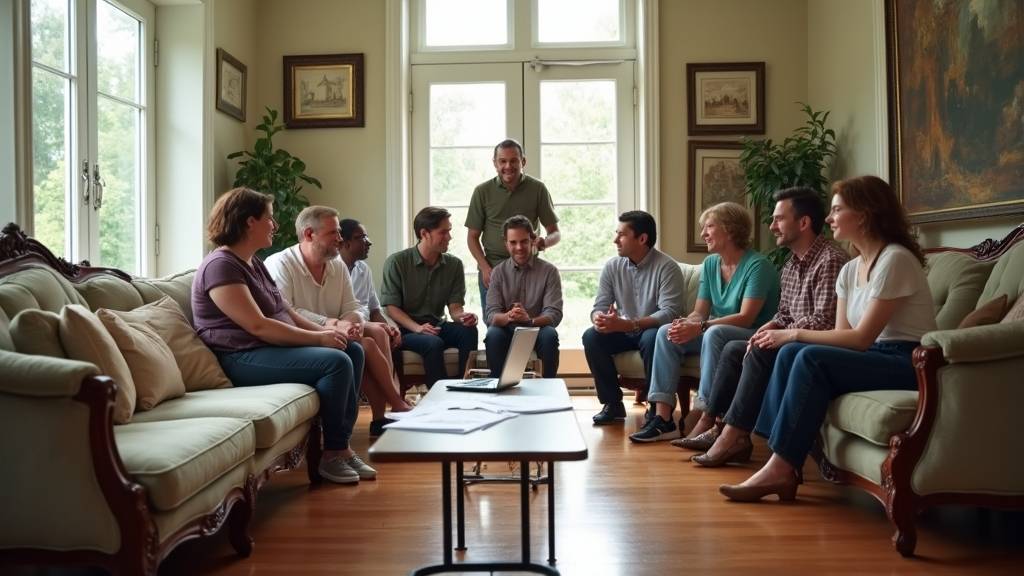When a loved one passes away, families often inherit a house together. Multiple heirs can have different ideas about what should happen next. This can quickly turn a simple sale into a complicated process.
Disagreements between siblings may stall decisions for months. Emotions run high, and misunderstandings are common. Legal hurdles and paperwork can make the process even harder.
The best way to sell a probate house with multiple heirs is to follow clear steps, communicate, and respect everyone’s rights. This approach keeps things fair and helps prevent conflicts.
It also ensures the sale goes smoothly. This blog will guide you through the process so you can avoid mistakes and sell your probate house with confidence.
Key Takeaways
- Obtain court approval and legal authority (Letters Testamentary or Administration) to manage and sell the probate property.
- Identify all heirs, confirm their shares, and maintain clear communication to document decisions and address disagreements.
- Secure, assess, and prepare the property by addressing repairs, ensuring safety, and keeping thorough records of all improvements.
- Determine fair market value using professional appraisal and comparative market analysis to set an appropriate listing price.
- Distribute sale proceeds according to the will or state law, ensuring all estate debts are paid and maintaining detailed records for compliance.
Understanding Probate and Its Impact on Property Sales

Probate is the legal process that allows property to transfer after the owner dies. It is needed before heirs can receive real estate. The court checks the will and approves someone to manage the estate. An executor cannot sell the property until the court gives permission. Probate laws set the rules for what documents are needed and how long things take. If the estate plan is clear, probate usually goes faster.
Complex situations or unclear wills can slow things down. If anyone ignores probate rules, it can delay the sale or cause legal problems. Following the court’s process saves time and avoids extra costs. Understanding probate procedures helps ensure the sale proceeds smoothly and legally. Additionally, proper compliance with Virginia inheritance laws and timely completion of probate documentation can significantly reduce delays.
Identifying All Heirs and Their Legal Rights
You’ll need to systematically identify all potential heirs by examining the decedent’s will, family records, and legal documents. Assess each heir’s statutory or testamentary rights to determine their precise inheritance shares under state law. This process ensures you comply with probate requirements and avoid future disputes during the property sale.
Additionally, understanding location and property value considerations can help you anticipate potential challenges from heirs based on the property’s significance and market value. Conducting a thorough liens and encumbrances search can also reveal any legal claims that might impact the sale process.
Locating All Potential Heirs
Finding all possible heirs is the first step in selling a probate property. This makes sure the sale is legal and avoids future problems. If you miss an heir, the sale could be challenged in court.
You should start by checking if there is a will. If a will exists, review it for named heirs. If not, look at probate court records and estate documents.
Public records can help confirm family relationships. Birth and marriage certificates often show connections between heirs. Prior estate filings may also list people with a legal claim.
If you need to check any document, always use certified or official copies. Courts and state offices can provide these. If records are unclear, cross-check information from different sources before moving forward.
Understanding Inheritance Shares
Inheritance shares are the portions of an estate each heir is legally entitled to receive. If a will exists, it usually details these shares. Without a will, state laws decide who receives what.
State laws often give priority to spouses and children. Extended family may inherit if no direct relatives exist. Each heir’s share depends on their legal relationship to the person who died.
Legal challenges can change how the estate is divided. Claims from omitted heirs or questions about legitimacy may arise. You must verify each heir’s eligibility and document their relationship to the deceased.
Clear inheritance shares help prevent disputes later. All heirs should understand their rights early in the process. This makes selling a probate house easier for everyone.
Appointing an Executor or Personal Representative

You’ll need to appoint an executor or personal representative with the legal authority to manage and sell the probate property. Carefully evaluate candidates based on their capacity to fulfill fiduciary duties, coordinate with heirs, and navigate probate procedures.
Once selected, obtain court-issued documentation—such as Letters Testamentary or Letters of Administration—to formalize their authority. Engaging a knowledgeable local team can help ensure a smooth process, especially when dealing with probate procedures and multiple heirs. Understanding the benefits of a quick sale can also be advantageous in reducing estate expenses and avoiding lengthy delays.
Executor Role and Responsibilities
Appointing an executor is essential for a smooth probate process. An executor manages the estate, follows the will, and meets court rules. This person acts as a central authority for all estate matters.
The executor must collect assets, pay debts, and file taxes. If heirs disagree, the executor helps resolve disputes fairly. Proper management reduces confusion and delays.
Courts expect the executor to follow deadlines and rules closely. If you miss a step, the estate may face legal problems. Careful work by the executor protects heirs and honors the decedent’s wishes.
Selection and Agreement Process
Choosing the executor or personal representative is the first step in probate. This decision affects how smoothly the estate is managed. If heirs agree, the process is faster and easier.
You should have open discussions and respect the wishes in the will. Heirs must understand inheritance laws to avoid confusion. The chosen person needs to be organized, fair, and good with finances.
Disagreements may happen if heirs feel left out or ignored. If there is a lack of trust, the process may slow down. Open communication can help build unity and trust.
Heirs may have strong emotional reactions during this process. If someone feels unheard, they may get frustrated. When there is fairness, heirs often feel relieved and less anxious.
Legal Authority Documentation
The court must give you legal authority before you can sell a probate house. This authority comes as Letters Testamentary or Letters of Administration. These documents let you act for the estate.
You must file a petition with the probate court to get this authority. The court needs the will, death certificate, and a list of heirs. Approval is required before you can manage the estate.
With legal authority, you can sign contracts and manage property tasks. You can then hire real estate agents, handle disclosures, and transfer titles. If you lack this authority, you cannot negotiate or list the property.
Proper documentation ensures the sale is legal and fair for all heirs. It also helps avoid disputes during the process. Always work with the court and follow state laws.
Securing and Assessing the Property

Securing and assessing the property is the first step after you gain legal authority as the estate’s representative. You should secure the home quickly to prevent theft, damage, or trespassing. Change the locks, check all doors and windows, and keep insurance active. If the house lacks security features, consider adding alarms or cameras. Inspect all entry points and mechanical systems for weaknesses.
Make sure the property is safe and complies with local codes. Additionally, consider trusted cash home buyers services to explore quick sale options if immediate liquidation is preferred. Assess the property’s condition by looking for structural problems or needed repairs. Document any issues, such as leaks or broken fixtures. Take clear photos and write notes for future reference.
Catalog all personal belongings left in the house. Keep a detailed list to help with fair distribution among heirs. If you find valuable or sensitive items, store them safely. A thorough assessment will help you plan repairs or improvements. Good records also help with online marketing and legal documentation. If you need help, consider hiring a professional inspector.
Valuing the Probate Property Accurately
To establish an accurate listing price, you must obtain a professional appraisal and conduct a thorough comparative market analysis. It’s critical to account for the property’s current condition, as deferred maintenance or needed repairs will impact its market value. By leveraging these valuation methods, you’ll position the probate house competitively and comply with your fiduciary obligations.
Additionally, understanding the types of fire damage and their long-term impact will help you better evaluate repair costs and potential resale value. Having a clear understanding of the local market conditions can further inform your pricing strategy and ensure a fair sale process.
Professional Appraisal Importance
A professional appraisal is important because it helps set the true market value of the property. If you skip this step, you risk mistakes in value. An accurate appraisal protects everyone’s interests.
A licensed appraiser uses standard methods like cost, income, and sales comparison. These methods make the valuation fair and objective. Courts, lenders, and buyers accept these unbiased reports.
If you have an appraisal, you get clear documents that explain the value. All heirs see how the value was set. This reduces confusion and arguments.
A professional appraisal lowers the chance of legal problems. You avoid claims of unfair pricing or favoritism. If you start early, the probate process can move faster and more smoothly.
Comparative Market Analysis
A Comparative Market Analysis (CMA) shows your property’s current value in the market. Real estate agents use CMA to compare your home with recently sold similar properties. If you need to know your home’s worth for probate or estate planning, a CMA gives you clear information.
A CMA looks at homes in the same area with similar size, age, and features. Agents also check active, pending, and closed listings. They adjust prices based on recent trends and local demand.
If you want to set a fair listing price, a CMA helps you decide. All heirs can see the same data, which can reduce disagreements. This process makes property transfer or estate planning faster and more transparent.
Addressing Property Condition
Property condition strongly affects a probate home’s market value. Buyers pay more for homes that look well-maintained and safe. Inspectors and appraisers will also notice property issues, which can lower the value.
A detailed inspection helps you find hidden problems. If you fix the most important issues, the home may appraise higher. Local code compliance is also important for an accurate value.
Home staging can make the home more appealing. If buyers like what they see, they may offer more money. Proper presentation can also help the home sell faster.
If you pay close attention to the property’s condition, you can set a fair price. This also gives you an advantage when negotiating with buyers.
Navigating Heir Disagreements and Communication
When several heirs must agree on selling a probate house, disagreements are common. Disputes often happen over the home’s value, sale conditions, or how to share the money. Clear and simple communication is key to solving these issues.
Regular meetings or group emails help everyone stay informed. These updates keep all heirs on the same page and reduce confusion. If heirs have different priorities, these channels help document them.
If a dispute grows serious, mediation or legal help may be needed. These steps can save time and money for everyone involved. Acting quickly on disagreements helps avoid long delays.
| Challenge | Solution | Technical Benefit |
|---|---|---|
| Value arguments | Get a professional appraisal | Sets a fair price |
| Poor communication | Use group updates | Shares information clearly |
| Money disputes | Seek legal advice | Ensures fair division |
Taking early action on communication and conflicts helps make the house sale smoother. This protects each heir’s interests and speeds up the process. Utilizing local real estate professionals can also facilitate smoother transactions and ensure everyone understands their options.
Reaching a Consensus on the Sale
Reaching a consensus among heirs is often difficult. A clear process can help reduce arguments and speed up decisions. Good communication and transparency are necessary during estate planning for probate property.
Heirs should set clear goals for the sale. If needed, they must check the property’s condition and market value before deciding when to sell. Written records of all agreements help ensure everyone is heard. Understanding the local Waynesboro market conditions can also influence the timing and pricing of the sale. A neutral facilitator can help mediate if heirs disagree.
Comparative market analysis gives facts to set a fair price. A written memorandum can define each heir’s duties and expectations for the sale. Additionally, understanding the full disclosure requirements helps prevent future legal issues and fosters trust among heirs. These methods make talks more fair and efficient. If everyone follows these steps, reaching an agreement becomes easier.
Handling Legal Paperwork and Court Approvals
After the heirs agree to sell, you must handle legal paperwork and get court approval. This step is necessary to meet state probate laws. The court checks your documents and gives permission before you can sell the property. Court approval is required before you can sell inherited property, ensuring all legal paperwork meets state probate laws.
You need to gather the will, estate records, and proof of beneficiaries. These papers are submitted to the court with your request to sell. The court will review your authority and the paperwork’s accuracy. If everything is correct, the judge will approve the sale.
You must also tell all heirs and creditors about the sale process. If you follow these steps, you avoid delays and protect the estate’s legal status. Court procedures and timelines are also important to monitor throughout the process. Additionally, understanding legal hurdles can help you navigate potential delays and ensure a smooth sale.
Choosing the Right Method to Sell the Property
Now you’ll need to determine whether a traditional market listing, an auction sale, or a direct cash buyer best aligns with your probate goals. Each method impacts marketing strategy, timeline, and potential net proceeds. Evaluate the property’s condition, local market dynamics, and court-imposed constraints to select the most effective selling approach. Consider the legal and contractual requirements involved in each option to ensure compliance and a smooth transaction.
Traditional Market Listing
The traditional market listing is a common way to sell a probate house. This method gives the house the most exposure to buyers. It usually helps sellers get the highest possible offer.
A real estate agent can guide you through the probate process. If you use an agent, they will protect the rights of all heirs. Listing on the open market also ensures you follow legal rules.
Buyers may compete, driving up the price. All offers are recorded for transparency. Agents experienced in probate sales can help avoid mistakes and delays.
Auction Sale Option
An auction is a fast and clear way to sell a probate house. It works well when you want a quick sale. If there are many heirs, auctions can make decisions easier and fair.
An auction sets a date for the sale and invites buyers to bid. If the house is popular, bidding can raise the final price. This method is helpful if you need to sell the house quickly or if heirs disagree.
You should value the property first to set a fair reserve price. If you set the reserve too low, you may get less than expected. Always work with a trusted auctioneer and discuss the plan with all heirs.
Direct Cash Buyer
Selling to a direct cash buyer is best if you need a fast and easy probate sale. If your main goal is quick closing or less stress for heirs, this method works well. It may not give you the highest sale price.
Cash buyers can close in a few days, speeding up the probate process. They buy properties as-is, so you avoid repairs or waiting for loan approvals. This saves time and reduces complications.
If there are many heirs and agreement is hard, a cash sale can help. Fewer negotiations mean less confusion and fewer delays. Cash offers are also less likely to fall through, making the sale more certain.
You should review your goals before choosing this method. If quick and simple is most important, a cash buyer is a good choice. If maximizing profit matters most, consider listing with an agent.
Preparing the Home for Market
You must check the home before putting it up for sale. Look for repairs, cosmetic updates, and issues with local building codes. Fixing problems early can help avoid legal disputes and raise the home’s value.
Inspect the foundation, roof, and main systems like heating and electrical. If there are safety concerns, such as faulty wiring, address them right away. Make sure all repairs meet local laws.
Update old paint with neutral colors and clean the floors. Remove clutter from every room to make the home more inviting. If you must meet safety rules, check smoke detectors and handrails.
Keep records of all repairs and upgrades. These documents help keep the process transparent. If several heirs are involved, clear records can prevent confusion and delays.
Working With Real Estate Professionals Experienced in Probate
Probate real estate transactions are complex and involve special legal steps. You should work with professionals who know probate sales well. They can help you follow the law and avoid mistakes.
Probate real estate deals are complicated, so it’s important to have experts who understand the legal process and can guide you safely.
A probate real estate agent understands court rules and probate laws. If you work with them, they can simplify communication among heirs. This reduces conflicts and keeps the process smooth.
Choose agents who have handled probate cases before. They should be good negotiators and know how to resolve family disagreements. If you need help with legal or money matters, they should have trusted contacts to assist.
Distributing Sale Proceeds Among Heirs
Once the probate court approves the property sale, you must share the money among the heirs. The division depends on the decedent’s will or state laws if there is no will. Always check the estate planning documents to confirm each person’s share.
If the will lists exact amounts or percentages, follow those instructions. Without a will, state laws decide who gets what, usually among spouses, children, or close relatives. These laws set the proportions for each heir.
You must pay all estate debts and costs before giving out the money. Creditors have the legal right to be paid first. Keep clear records of all payments and distributions.
Accurate records help prove you followed the law and reduce family disagreements. Careful handling makes the inheritance process smoother for everyone.
Addressing Tax Implications and Financial Considerations
Selling a probate house affects the estate’s taxes and overall finances. This sale can give the estate cash but may also create tax obligations. You should review these possible tax effects before making decisions.
If the property has gained value, there may be capital gains tax. Heirs often receive a “step-up in basis,” which can lower this tax. If the estate is large, estate or inheritance taxes may apply, depending on the state.
Professional fees and some expenses may be tax-deductible for the estate. You should check if these deductions can lower the estate’s taxable income. It is wise to consult a tax advisor to understand your options and avoid mistakes.
Preventing and Resolving Potential Disputes
Disputes can happen during a probate home sale if there is poor documentation or unclear communication. Early and clear communication with heirs helps prevent most conflicts. Regular updates about valuations, offers, and contracts keep everyone informed.
If disagreements arise, use formal methods like mediation or arbitration. Legal counsel or a neutral mediator can help resolve complex issues. All agreements and decisions should be put in writing.
If heirs share concerns early, problems are easier to solve. Address issues as soon as they appear to avoid escalation. Open dialogue and structured resolution protect the estate’s value for everyone.
Conclusion
If you need to sell a probate house with multiple heirs, clear communication is essential. If you document every step and follow probate laws, you can avoid many common issues. Legal guidance and transparency will help ensure a smooth process.
If the process seems overwhelming, you are not alone. If you want a fast and simple sale, we buy houses for cash. This option can help you distribute proceeds quickly and fairly among heirs.
If you are ready to sell or have questions, we can help. Contact Align Real Estate Solutions today to discuss your options and get started. We are here to make the probate sale as easy as possible for you.
Author
-

Zach Koops is co-founder and Real Estate Success Manager at Align Real Estate Solutions, serving homeowners across Virginia since 2024. With a passion for real estate and a heart for people, Zach has built his career around helping sellers navigate tough situations—foreclosure, inheritance, relocation, repair-overload—with clarity and compassion. He’s known for being straightforward, steady under pressure, and deeply invested in relationships. Outside of work, he spends his time as a husband and father, enjoys the outdoors in Shenandoah Valley, loves singing on stage, and constantly seeks growth through reading and new experiences.









